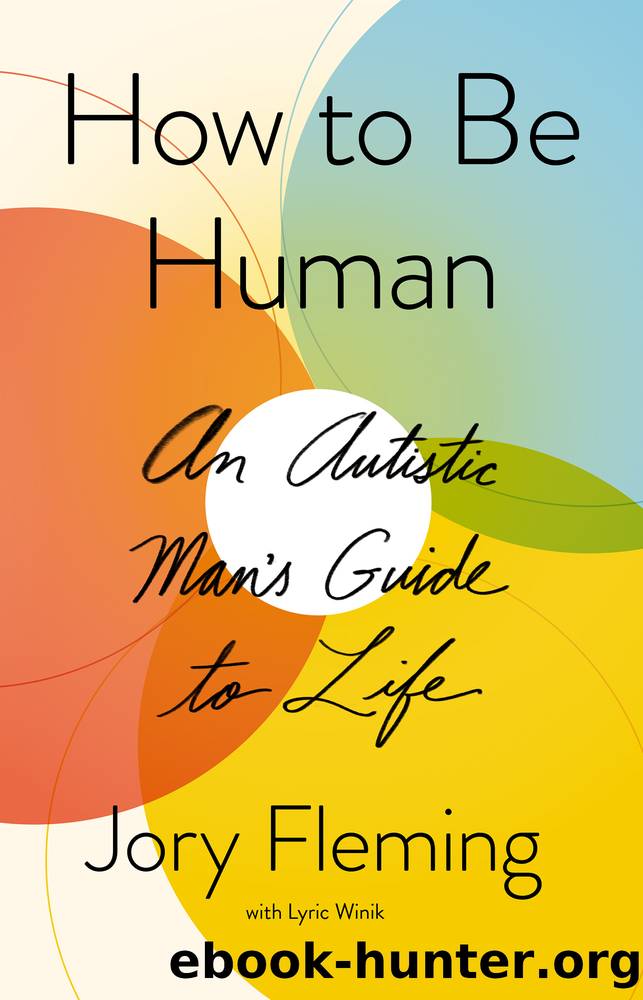How to Be Human by Jory Fleming

Author:Jory Fleming
Language: eng
Format: epub
Publisher: Simon & Schuster
Published: 2021-04-20T00:00:00+00:00
Talking about Other Peopleâs Emotions:
Jory is extremely conscious of his own struggles with emotional awareness and responses.
He is deeply concerned about inadvertently hurting someone else or causing pain because he has not picked up on their words or nonverbal signals and thus has not responded appropriately. He worries about and tries to watch every word that he speaks. And this from a young man who at the start of his life could hardly speak at all.
Listening to him, I was repeatedly struck by the deep burden and responsibility he feels to not injure other peopleâs emotional well-being. Joryâs various references to his own inadequaciesââIâm bad atââmade me want to interrupt him to apologize for everyone who has ever made him feel that he is somehow a lesser person or has forced upon him a custodial role for other peopleâs feelings.
On his own, Jory has developed a very unique way to compensate for some of his emotional intelligence shortcomings. He read a manual that most people would probably largely ignore. As he says, âWho knows how much of the worldâs knowledge is locked up in manuals that nobodyâs thought to read?â
LW: Pull out some Jory beads and give me a picture of how you envision other peopleâs emotions, how they appear to you, and how you pick up on them.
JORY: I donât think emotions are always linked to fragility; they can sometimes be linked to strength. Iâd envision it like walking down a sidewalk where most of it is pavement. But occasionally there are some eggshells and rocks that are the same color as the pavement. If you step on the rocks, you think, Ow, but thatâs because of somebodyâs emotional strength that you are not expecting. And if you step on the eggshells, they break. I like that image because if Iâm looking at the sidewalk, it can be difficult, if the rocks and the eggshells are the same color, to pick out which one is where as I walk.
A more explicit emotion is easier for me to pick up on than implicit emotion. If somebody is feeling down or anxious or something like that, they may say something which most people would pick up on. But if they did not literally say âIâm feeling anxious,â I might not pick up on that feeling. Or I would misinterpret it. If someone who is super stressed-out studying for exams says, âI havenât been sleeping well,â I may not connect it. If Iâm reminded that itâs exam period, then Iâll be like oh, they were feeling anxious and thatâs why they couldnât sleep.
Most people donât explicitly display anxiety, or if they do, itâs really subtle. I was having breakfast with a music major, and he had a recital later in the day. Toward the end of our conversation, he mentioned that he was feeling nervous about the day ahead. Once he said that explicitly, it made me connect other things that I hadnât picked up on before but were now more easily noticeable, like he was drinking copious amounts of water.
Download
This site does not store any files on its server. We only index and link to content provided by other sites. Please contact the content providers to delete copyright contents if any and email us, we'll remove relevant links or contents immediately.
I Capture the Castle by Dodie Smith(1571)
Aspergirls by Rudy Simone(1360)
Be Different by John Elder Robison(1329)
Autism's False Prophets by Paul A. Offit(1238)
My Child's Different by Elaine Halligan(1228)
Smart but Scattered—and Stalled by Richard Guare(1193)
What's Making Our Children Sick? by Michelle Perro(1155)
101 Tips for the Parents of Boys with Autism by Ken Siri(1151)
Asperger Syndrome (Autism Spectrum Disorder) and Long-Term Relationships by Ashley Stanford(1111)
ADHD by Mark Selikowitz(1105)
An Adult with an Autism Diagnosis by Gillan Drew(1070)
Girlish by Lara Lillibridge(1067)
Nerdy, Shy, and Socially Inappropriate by Cynthia Kim(1053)
Animal-assisted Interventions for Individuals with Autism by Temple Grandin(1035)
On Immunity: An Inoculation by Biss Eula(1026)
Seeing Ezra by Kerry Cohen(1004)
Overcoming ADHD by Stanley I. Greenspan & Jacob (con) Greenspan(989)
Why Gender Matters by Leonard Sax M.D. Ph.D(981)
Sarah's Child (Hqn Romance) by Linda Howard(976)
